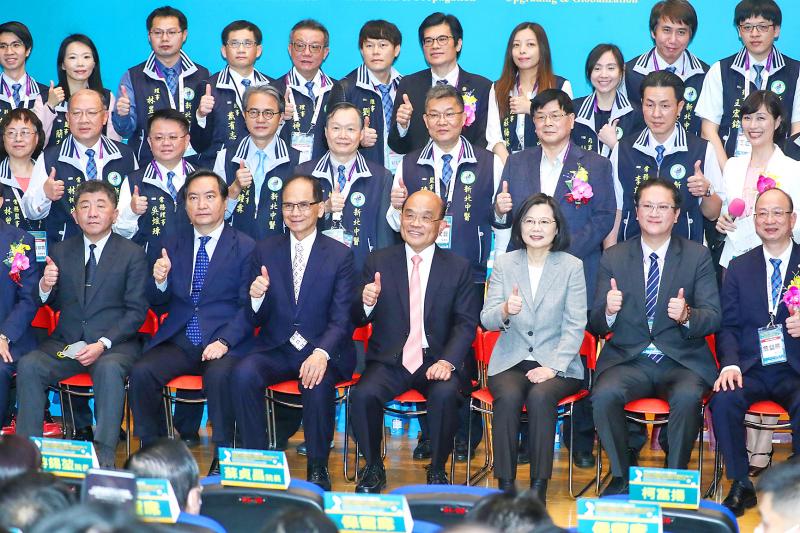The government would protect Taiwan’s traditional Chinese medicine industry and promote its expansion into international markets, President Tsai Ing-wen (蔡英文) said yesterday.
Its successful use in combating COVID-19 deaths has demonstrated the potential that traditional Chinese medicine developed in Taiwan has in international markets, and the government would ensure the quality of the medicine produced, she said.
Tsai was speaking an event in Taipei marking the 92nd anniversary of the founding of the National Research Institute of Chinese Medicine.

Photo: CNA
The institute was responsible for the development of a traditional Chinese medicine formula called Taiwan Chingguan Yihau (清冠一號), or NRICM101, which it was granted permission to export in 2020.
Tsai thanked Chinese Medical Doctors’ Association secretary-general Ko Fu-yang (柯富揚) for his work on Chingguan Yihau.
Ko has developed a treatment program that integrates traditional Chinese medicine and conventional medicine, demonstrating how the two can be used concurrently to treat serious illnesses, she said.
The government is working on building a long-term treatment program for elderly people that incorporates traditional Chinese medicine, she said.
“Taiwan is an aging society, and elderly Taiwanese trust traditional Chinese medicine,” she said.
The government last year commissioned the development of targeted traditional Chinese medicine treatment plans for common health problems such as diabetes, breast cancer and high blood pressure, she said.
“We are also doing more to ensure the quality of traditional Chinese medicine products by inspecting materials at customs, and conducting random market inspections,” she said.
At the same time, the government is offering assistance to traditional Chinese medicine manufacturers who are interested in expanding to international markets, she said.
For example, the government is cooperating with countries targeted by the New Southbound Policy to have traditional Chinese medicine produced in Taiwan made available to physicians in those countries, Tsai said.

Taiwanese can file complaints with the Tourism Administration to report travel agencies if their activities caused termination of a person’s citizenship, Mainland Affairs Council Minister Chiu Chui-cheng (邱垂正) said yesterday, after a podcaster highlighted a case in which a person’s citizenship was canceled for receiving a single-use Chinese passport to enter Russia. The council is aware of incidents in which people who signed up through Chinese travel agencies for tours of Russia were told they could obtain Russian visas and fast-track border clearance, Chiu told reporters on the sidelines of an event in Taipei. However, the travel agencies actually applied

New measures aimed at making Taiwan more attractive to foreign professionals came into effect this month, the National Development Council said yesterday. Among the changes, international students at Taiwanese universities would be able to work in Taiwan without a work permit in the two years after they graduate, explainer materials provided by the council said. In addition, foreign nationals who graduated from one of the world’s top 200 universities within the past five years can also apply for a two-year open work permit. Previously, those graduates would have needed to apply for a work permit using point-based criteria or have a Taiwanese company

The Shilin District Prosecutors’ Office yesterday indicted two Taiwanese and issued a wanted notice for Pete Liu (劉作虎), founder of Shenzhen-based smartphone manufacturer OnePlus Technology Co (萬普拉斯科技), for allegedly contravening the Act Governing Relations Between the People of the Taiwan Area and the Mainland Area (臺灣地區與大陸地區人民關係條例) by poaching 70 engineers in Taiwan. Liu allegedly traveled to Taiwan at the end of 2014 and met with a Taiwanese man surnamed Lin (林) to discuss establishing a mobile software research and development (R&D) team in Taiwan, prosecutors said. Without approval from the government, Lin, following Liu’s instructions, recruited more than 70 software

Chinese spouse and influencer Guan Guan’s (關關) residency permit has been revoked for repeatedly posting pro-China videos that threaten national security, the National Immigration Agency confirmed today. Guan Guan has said many controversial statements in her videos posted to Douyin (抖音), including “the red flag will soon be painted all over Taiwan” and “Taiwan is an inseparable part of China,” and expressing hope for expedited reunification. The agency last year received multiple reports alleging that Guan Guan had advocated for armed reunification. After verifying the reports, the agency last month issued a notice requiring her to appear and explain her actions. Guan